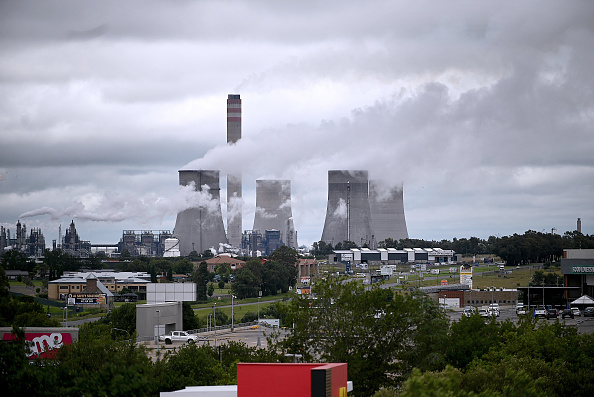Just 11 days after Eskom was granted exemptions from complying with air pollution laws for eight of its power stations, the Supreme Court of Appeal (SCA) handed down its judgment dismissing, with costs, the appeal brought by the Minister of Forestry, Fisheries and the Environment against the 18 March 2022 “Deadly Air” judgment. The “Deadly Air” case was launched in June 2019 by environmental justice groups groundWork and the Vukani Environmental Justice Movement in Action who called for government to take action to address the toxic air pollution in the Highveld Priority Area (HPA).
The High Court had confirmed in the landmark “Deadly Air” judgment that the HPA’s poor air quality breached residents’ section 24(a) constitutional rights to an environment that is not harmful to their health or well-being. The applicants demonstrated that the main sources of the dangerous air pollution in the area are Eskom’s coal-fired power stations and Sasol’s Secunda synfuels facility, and that the pollution causes severe health impacts and premature deaths. The High Court held that the environmental right is immediately realisable, and that the state’s inaction in addressing the HPA’s “deadly air” was violating that right.
According to the court, the minister has a legal duty to prescribe regulations (in terms of the National Environmental Management: Air Quality Act) to implement and enforce the HPA’s air quality management plan (AQMP) and had unreasonably delayed in doing so. The minister was ordered to prepare, initiate, and prescribe these regulations within 12 months.
The Air Quality Act provides for a priority area to be declared when air quality standards are being exceeded, or any other situation exists which is causing a significant negative impact on air quality in the area; and the area requires specific management action to rectify the situation. An AQMP must then be prepared to:
- coordinate air quality management;
- address the poor air quality; and
- provide for the plan’s implementation by a committee representing relevant role-players.
The Act provides also that the minister “may prescribe regulations necessary for implementing and enforcing approved priority area air quality management plans…”. Although the HPA was declared in 2007, with its AQMP published in 2012, little progress has been made to implement and enforce the HPA’s AQMP.
The minister appealed the portion of the “Deadly Air” decision that held that the minister has a legal duty – as opposed to a discretion – to publish the regulations. Although the minister published the necessary regulations two days before the SCA hearing, the SCA held that it was in the interests of justice for the appeal to be heard “[d]ue to the discrete legal point of public importance which will affect matters in the future and on which the adjudication of this Court is required”.
The SCA confirmed that “the word ‘may’ in a legislative provision may confer a discretion that is coupled with a duty to exercise it when the conditions prescribed as justifying its exercise have been met. In this matter, that jurisdictional fact is ‘necessity’. Once the jurisdictional fact of necessity has been objectively established, the duty to create regulations arises”.
In evaluating whether such necessity existed in this case, the SCA considered the long background to the matter, including the “uncontroverted affidavits” deposed to by residents, detailing the significant health impacts of the air pollution in the area. The SCA pointed out that the medium-term review of the HPA AQMP, prepared by then Department of Environmental Affairs (overseen by the minister), acknowledged that the Department was supposed to develop regulations to implement and enforce the AQMP. Similarly, a socio-economic impact assessment report by the Department stated that HPA air quality remained at harmful levels and that existing regulatory measures were insufficient to give effect to the AQMP. The assessment evidenced the “continued violation of the constitutionally protected human rights”.
The SCA held:
The Impact Assessment Report also indicated that the main cause of the challenges related to the implementation of the Highveld Plan was the negative attitudes from major polluters who did not consider the air quality management plans as binding legal documents, and that stakeholders could not be held accountable as no punitive measures could be applied. Its final conclusion was that the best course of action would be to create implementation regulations because that could potentially save lives and yield better health outcomes.
The court pointed out that these facts revealed that the minister’s claim that air quality management was aligned with international standards, was not true. These “compelling factors … ineluctably point to the need to create the regulations. The very fact that high levels of pollution continue unabated in the HPA despite the dangers they pose to the community, including children, is a clear attestation that the non-binding set of goals contained in the Highveld Plan are insufficient to achieve the substantial reductions in atmospheric emissions that are required in the HPA.” The SCA held that it was clear that “more serious interventions became necessary”.
The SCA held that “the necessity for prescribing the regulations to ensure the implementation and enforcement of the Highveld Plan is indisputable”:
In the face of ongoing high levels of air pollution, the Minister was dutybound to act, and with the passage of time, the creation of the regulations became imperative. By the time the application was heard in the high court, the urgency of the creation and publication of these Regulations was unquestionable. The fact that the Regulations were published more than ten years after the publication of the Highveld Plan is a lost opportunity in the quest for an environment that is not harmful to the inhabitants of this country.
The court went further:
… even if it were to be accepted that the usage of the word ‘may’ meant that the Minister had a discretion whether or not to publish the Regulations, it is clear that Chapter 4 of the Air Quality Act calls for prompt, efficient and coordinated action to address dangerously high levels of air pollution. Any dragging of feet in addressing the problems would therefore undermine the achievement of this purpose. Under these circumstances, it would be absurd to conclude that the Minister’s delay in publishing the regulations amounted to a proper exercise of her discretion. There can be no doubt that in the context of this matter, the Minister’s failure to make the regulations would have amounted to an improper exercise of that discretion.
This important victory emphasises the need for meaningful enforcement measures for all legislation that seeks to protect the constitutional right to an environment not harmful to health or well-being. For instance, although conditions have been attached to the Eskom minimum emission standards exemption decisions and the Sasol sulphur dioxide emission standards appeal decision, it is not clear what steps government intends to take should these conditions be violated. Similarly, the failure to attach any penalties to non-compliance with carbon budgets (that govern the maximum amount of greenhouse gases that major polluters can emit) – in terms of the Climate Change Act – means that polluters will continue to escape accountability.






